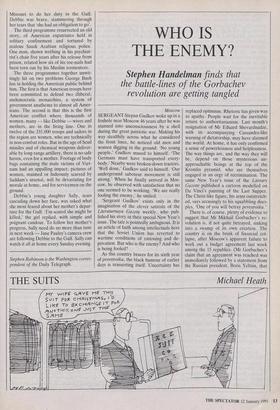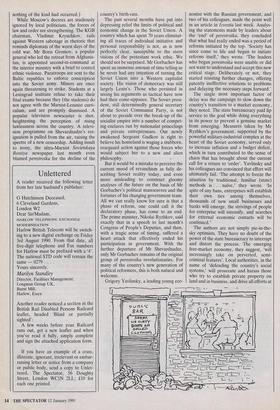WHO IS THE ENEMY?
Stephen Handelman finds that
the battle-lines of the Gorbachev revolution are getting tangled
Moscow SERGEANT Stepan Gudkov woke up in a foxhole near Moscow 46 years after he was stunned into unconsciousness by a shell during the great patriotic war. Making his way stealthily across what he considered the front lines, he noticed old men and women digging in the ground. 'No young people,' Gudkov mused to himself. 'The Germans must have transported every- body.' Nearby were broken-down tractors. `Well done,' Gudkov said to himself. 'Our underground saboteur movement is still strong.' When he finally arrived in Mos- cow, he observed with satisfaction that no one seemed to be working. 'We are really fooling the enemy,' he smiled.
`Sergeant Gudkov' exists only in the imagination of the clever satirists of the Literaturnaya Gazeta weekly, who pub- lished his story in their special New Year's issue. The tale is pointedly ambiguous. It is an article of faith among intellectuals here that the Soviet Union has reverted to wartime conditions of rationing and de- privation. But who is the enemy? And who is being fooled?
As this country braces for its sixth year of perestroika, the black humour of earlier days is reasserting itself. Uncertainty has replaced optimism. Rhetoric has given way to apathy. People wait for the inevitable return to authoritarianism. Last month's resignation of Mr Eduard Shevardnadze, with its accompanying Cassandra-like warning of dictatorship, may have alarmed the world. At home, it has only confirmed a sense of powerlessness and helplessness. The way things are, and the way they will be, depend on those mysterious un- approachable beings at the top of the Kremlin pyramid, who are themselves engaged in an orgy of recrimination. The same New Year's issue of the Literary Gazette published a cartoon modelled on Da Vinci's painting of the Last Supper. The Christ-like figure, his arms outstretch- ed, says accusingly to his squabbling disci- ples, 'One of you will betray perestroika.'
There is, of course, plenty of evidence to suggest that Mr Mikhail Gorbachev's re- volution is, if not quite betrayed, sinking into a swamp of its own creation. The country is on the brink of financial col- lapse, after Moscow's apparent failure to work out a budget agreement last week among the 15 republics. (Mr Gorbachev's claim that an agreement was reached was immediately followed by a statement from the Russian president, Boris Yeltsin, that nothing of the kind had occurred.) While Moscow's decrees are studiously ignored by local politicians, the forces of law and order are strengthening. The KGB chairman, Vladimir Kryuchkov, rails against Western sabotage in rhetoric that reminds diplomats of the worst days of the cold war. Mr Boris Gromov, a popular general who led the retreat from Afghanis- tan, is appointed second-in-command at the interior ministry with a brief to control ethnic violence. Paratroops are sent to the Baltic republics to enforce conscription into the Soviet army. Miners are once again threatening to strike. Students at a Leningrad institute refuse to take their final exams because they (the students) do not agree with the Marxist-Leninist curri- culum, and are promptly dismissed. A popular television newscaster is shot, heightening the perception of rising lawlessness across the country. A televi- sion programme on Shevardnadze's res- ignation is pulled from the air, raising the spectre of a new censorship. Adding insult to irony, the ultra-Marxist Sovietskaya Rossiya newspaper last month even blamed perestroika for the decline of the country's birth-rate.
The past several months have put into depressing relief the limits of political and economic change in the Soviet Union. A country which has spent 70 years eliminat- ing all traces of individual initiative and personal responsibility is not, as is now perfectly clear, susceptible to the stern visions of the protestant work ethic. We should not be surprised. Mr Gorbachev has spent an immense amount of time telling us he never had any intention of turning the Soviet Union into a Western capitalist society. His vision of democracy was still largely Lenin's. Those who persisted in seeing his arguments as tactical have now had their come-uppance. The Soviet presi- dent, still determinedly general secretary of the Soviet Communist Party, is not about to preside over the break-up of the socialist empire into a number of compet- ing enclaves run by nationalist princelings and private entrepreneurs. Our newly awakened Sergeant Gudkov is right to believe his homeland is waging a stubborn, rearguard action against those forces who would subject her to a new and alien philosophy.
But it would be a mistake to perceive the current mood of revanchism as fully de- scribing Soviet reality today, and even more misleading to construct gloomy analyses of the future on the basis of Mr Gorbachev's political manoeuvres and the fortunes of his changing government team. All we can really know for sure is that a phase of reform, one could call it the declaratory phase, has come to an end. The prime minister, Nikolai Ryzhkov, said exactly that in a speech to last month's Congress of People's Deputies, and then, with a tragic sense of timing, suffered a heart attack that effectively ended his participation in government. With the further departure of Mr Shevardnadze, only Mr Gorbachev remains of the original group of perestroika revolutionaries. For many of the country's new generation of political reformers, this is both natural and welcome.
Grigory Yavlinsky, a leading young eco- nomist with the Russian government, and two of his colleagues, made the point well in an article in Izvestia last week. Analys- ing the statements made by leaders about the 'end' of perestroika, they concluded that what had really ended was a period of reforms initiated by the top. 'Society has since come to life and begun to initiate reforms itself,' they wrote. `The leaders who began perestroika were unable or did not want to understand and accept this new critical stage. Deliberately or not, they started resisting further changes, offering patently ineffective solutions to problems and delaying the necessary steps forward.'
The single most important factor of delay was the campaign to slow down the country's transition to a market economy, they noted. The state bureaucracy paid lip service to the goal while doing everything in its power to prevent a genuine market from emerging. Measures taken by Mr Ryzhkov's government, supported by the powerful military-industrial complex at the heart of the Soviet economy, served only to increase inflation and a budget deficit, which in turn contributed to the sense of chaos that has brought about the current call for a return to 'order'. Yavlinsky and his colleagues are convinced that effort will ultimately fail. 'The attempt to freeze the situation by traditional, familiar (state) methods is naive,' they wrote. `In spite of any bans, enterprises will establish their own ties among themselves, thousands of new small businesses and banks will emerge, the strivings of people for enterprise will intensify, and searches for external economic contacts will be continued.'
The authors are not simply pie-in-the- sky optimists. They have no doubt of the power of the state bureaucracy to interrupt and distort the process. The emerging free-market economy, they suggest, 'will increasingly take on perverted, semi- criminal features'. Local authorities, in the name of `defending the country's social systems,' will prosecute and harass those who try to establish private property on land and in business, and drive all efforts at private enterprise into the shady world of black market speculation.
A similar process seems inevitable in the political arena. The early efforts to grant autonomy to regions and create democratic parliamentary institutions have ignited a full-blown political culture that now chal- lenges the authority of the centre. Moscow has reacted predictably with warnings that `political extremism' now threatens the stability of the state. It is no surprise that the cries of 'I told you so' from the old guard have found a certain receptiveness in Mr Gorbachev. None other than Yegor Ligachev, for years the arch-symbol of reaction, claimed triumphantly only a few weeks ago that the Soviet leader was now on the right side. 'I can tell you frankly that Gorbachev's position and mine dovetail at last on some questions,' he said.
Again, as in the economic sphere, attempts to turn back the clock on the democratisation of Soviet society are not likely to have the kind of long-term results which the orthodox fervently hope for. Only military force would be able to end the assertiveness of republics who are presently redefining the nature of their relationship with Moscow, and only a reimposition of the gulag would stop the bleeding away of Communist party author- ity to opposing rival political groups. De- spite the dark warnings — or perhaps because of them — neither solution is imaginable.
For the same reasons that he cannot accept democratic reformers who are re- defining his revolution, Mr Gorbachev is too enmeshed in institution-building to allow the neo-Stalinists an opportunity to subvert perestroika to their own needs. Free, relatively open, debate has become an ineradicable part of the Soviet lead- ership's own claim to legitimacy. In earlier times in Soviet history, one could not imagine ministers of state standing up to warn about dictatorship and remaining free men. Which is not to say that the current efforts to squeeze political and economic change along channels acceptable to the state can be safely ignored. This is the essence of Mr Yavlinsky's article, and it is perhaps how Mr Shevardnadze's warning should be read. If there is a danger of dictatorship it lies, as some Soviet com- mentators note, not with the actions of authorities but in the reactions of ordinary Soviet people who think there is no other way out. 'We keep speaking of civil war, a total economic collapse and even a military coup,' wrote an historian named A. Kiva last month. 'Why? Does what happens to us not depend on ourselves?' As the mythical Sergeant Gudkov continues to stumble across the ravaged landscape of the modern Soviet Union, he is likely to discover that the enemy keeping his coun- try under siege is none other than himself.
Stephen Handelman is Moscow Bureau Chief of the Toronto Star.












































 Previous page
Previous page